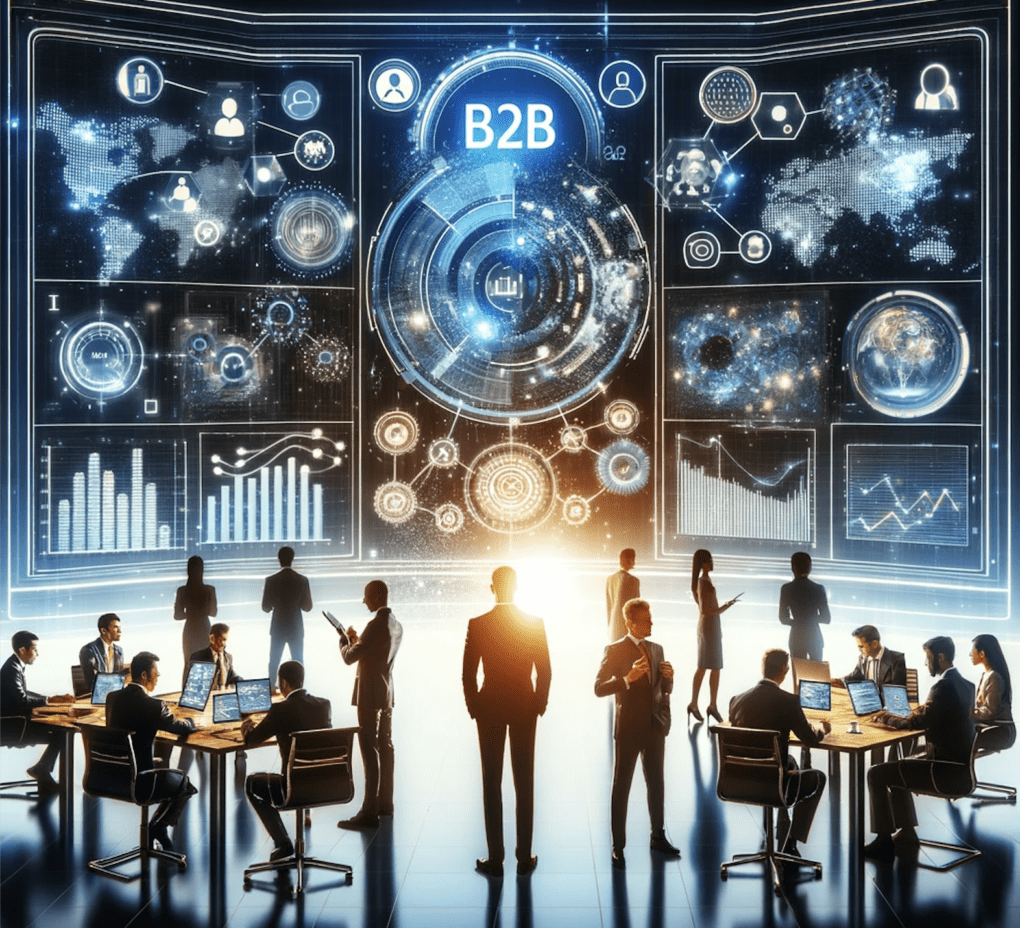Why businesses are adopting Growth Systems For B2B for scalability
Open Effectiveness and Growth With AI Automation for B2B Firms
AI automation is changing the landscape for B2B business. It enhances operations and reduces dependence on human treatment. This shift permits organizations to make quicker, data-driven decisions. As organizations discover which processes to automate, they should also take into consideration the right tools to implement. Obstacles remain in adopting AI modern technology. The effects of these modifications could shape the future of several business in ways yet to be fully recognized
Comprehending AI Automation in the B2B Context
As services increasingly seek performance, comprehending AI automation in the B2B context ends up being important. AI automation entails utilizing advanced modern technologies to enhance operations, lower human intervention, and enhance decision-making procedures. In the B2B landscape, this can manifest in numerous forms, such as automating customer support communications, handling supply chain logistics, or optimizing advertising and marketing campaigns. Firms can leverage AI to assess enormous datasets promptly, enabling them to identify trends and understandings that inform calculated choices. AI systems can incorporate seamlessly with existing innovations, giving a cohesive system for taking care of company features. This understanding lays the foundation for organizations to check out just how AI can transform their operations, enhance performance, and ultimately foster sustainable growth in an open market.
Key Benefits of Executing AI Automation

Recognizing Procedures Appropriate for Automation

Picking the Right AI Tools for Your Organization
When B2B business think about automating their procedures, picking the right AI tools ends up being vital for achieving preferred outcomes. Business ought to begin by examining their distinct needs and objectives, guaranteeing alignment with organization objectives (Minarik AI). Examining the integration, flexibility, and scalability abilities of possible devices is critical, as these factors figure out long-lasting effectiveness. Organizations ought to additionally take into consideration user-friendliness and the degree of assistance given by vendors, as these aspects can affect effective application. Additionally, examining client testimonials and study can give insights right into exactly how certain AI services carry out in real-world situations. By thoroughly choosing AI devices that fit their functional needs, B2B companies can enhance efficiency and drive development while lessening prospective disruptions
Overcoming Obstacles in AI Fostering
B2B firms often come across considerable difficulties in taking on AI technologies, particularly concerns associated to data quality and resistance to change management. Poor data high quality can hinder the performance of AI systems, while worker unwillingness to accept brand-new processes can delay application efforts - AI Automation For B2B. Resolving these difficulties is necessary for successful AI combination and optimizing its potential benefits
Data Quality Issues
Assuring high data quality is crucial for the effective fostering of AI modern technologies in business-to-business atmospheres. Unreliable, incomplete, or outdated information can badly impede AI campaigns, bring about incorrect understandings and bad decision-making. Companies usually deal with difficulties such as information silos, variances across various sources, and an absence of standard data layouts. To get rid of these issues, companies must purchase data cleansing, assimilation, and governance procedures. Executing durable data administration techniques ensures that the details fed into AI systems is pertinent and reliable. Additionally, fostering a culture of information quality understanding amongst employees can improve information precision in time. By dealing with information top quality issues, B2B business can launch the complete possibility of AI automation, driving efficiency and growth.
Modification Monitoring Resistance

Determining the Effect of AI Automation
Measuring the influence of AI automation in B2B business requires a clear understanding of crucial performance indicators (KPIs) that straighten with company objectives. Efficient data evaluation methods are important for analyzing the results, while durable ROI evaluation strategies aid identify the economic benefits of automation initiatives. Together, these parts supply a comprehensive structure for assessing AI's payments to organizational success.
Trick Performance Indicators
Trick performance indications (KPIs) function as essential tools for B2B firms to evaluate the performance of AI automation initiatives. By developing clear metrics, companies can determine renovations in operational effectiveness, cost reduction, and earnings growth straight attributable to automation. Common KPIs consist of cycle time reduction, mistake rates, client satisfaction ratings, and employee performance degrees. These indicators supply insights right into how AI systems are enhancing procedures and enhancing overall efficiency. In addition, tracking KPIs enables business to recognize areas for more renovation and to align AI automation efforts with critical business objectives. Ultimately, a well-defined framework of KPIs assurances that B2B firms can quantitatively review the impact of AI automation on their operations and drive continuous growth.
Data Evaluation Methods
Reliable information evaluation strategies play an important function in assessing the impact of AI automation within B2B business. By using statistical approaches, companies can identify trends and patterns in functional data, enabling them to evaluate the efficiency gains attained through automation. Methods such as regression analysis and time series forecasting give understandings right into exactly how AI-driven processes influence productivity and decision-making. Additionally, information visualization devices can properly connect searchings for to stakeholders, promoting educated calculated decisions. Artificial over at this website intelligence algorithms can further enhance evaluation by forecasting future outcomes based on historic information, providing actionable understandings. Eventually, these techniques make it possible for B2B firms to determine success and optimize their AI automation campaigns, making certain positioning with business purposes and improving overall efficiency.
ROI Evaluation Strategies
Reviewing the roi (ROI) of AI automation is necessary for B2B companies looking for to comprehend the financial ramifications of their technological campaigns. Companies can use different ROI assessment methods to evaluate the effectiveness of AI applications - AI Automation For B2B. One reliable method entails calculating price financial savings by comparing operational expenditures before and after automation (Minarik AI). Additionally, gauging performance improvements with crucial performance indicators (KPIs) helps evaluate the benefits of AI. Client fulfillment metrics can also offer understandings right into the impact of automation on solution high quality. To assure an extensive assessment, business must think about both straight abstract benefits and economic returns, such as improved decision-making capacities and competitive benefit. This multifaceted analysis allows B2B firms to make informed choices regarding future investments in AI technology
Future Patterns in AI Automation for B2B Firms
What developments exist in advance for AI automation in B2B companies? Arising fads indicate a considerable change towards enhanced information analytics capacities, enabling services to make even more informed decisions. Anticipating analytics will end up being progressively essential, enabling business to expect market adjustments and customer needs. Furthermore, the combination of AI with Net of Points (IoT) modern technology is expected to improve operations by supplying real-time understandings and automation of procedures. Firms will certainly additionally concentrate on improving customer experiences through personalized advertising driven by AI algorithms. Additionally, improvements in all-natural language handling will certainly assist in far better interaction in between customers and organizations. As these fads evolve, B2B firms have to adjust to utilize AI automation properly, ensuring continual development and affordable advantage.
Often Asked Questions
What Industries Advantage the Most From AI Automation in B2B?
Manufacturing, finance, medical care, and logistics markets benefit the most from AI automation in B2B. These sectors utilize AI to enhance processes, boost decision-making, and boost general operational performance, driving considerable growth and technology.
Exactly How Does AI Automation Impact Staff Member Responsibilities and Responsibilities?
AI automation reshapes staff member functions and obligations by streamlining repetitive jobs, allowing employees to concentrate on strategic efforts. This shift cultivates skill development, enhances performance, and encourages partnership, ultimately driving organizational development and advancement.
What Prevail Mistaken Beliefs Concerning AI Automation in B2B?
Common misunderstandings concerning AI automation in B2B consist of concerns of job loss, ideas that AI can fully change human judgment, and ignoring the relevance of collaboration in between AI systems and staff members for optimal outcomes.
How Can Companies Make Sure Information Personal Privacy With AI Automation?
Businesses can ensure data personal privacy with AI automation by applying durable encryption protocols, adhering to regulative compliance, carrying out routine audits, and training staff members on information taking care of practices to reduce risks and safeguard sensitive info.
What Are the Expenses Connected With Applying AI Automation?
The prices linked with applying AI automation consist of software acquisition, facilities upgrades, training personnel, ongoing maintenance, and potential downtime throughout assimilation. In addition, firms might sustain costs connected to data safety and security and compliance measures.
Determining the effect of AI automation in B2B companies requires a clear understanding of vital efficiency signs (KPIs) that line up with company objectives. Key efficiency indicators (KPIs) offer as crucial devices for B2B companies to evaluate the effectiveness of AI automation efforts. Effective information analysis methods play a vital function in reviewing the effect of AI automation within B2B business. Evaluating the return on investment (ROI) of AI automation is essential for B2B firms looking for to comprehend the economic ramifications of their technological initiatives. What developments lie in advance for AI automation in B2B business?